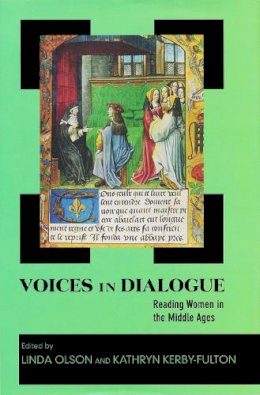Linda Olson is professor of English at the University of Victoria, Victoria, British Columbia.
“Contributions to the volume represent an important resource for new research in medieval cultural and textual history; its impressive lineup of contributors and its dialogic layout make this collection a demonstration of the responsive creative context in which these authors view their subjects.” —English Historical Review “ . . . several of the dialogues . . . provide marvelous big-picture discussions of medieval women that probably all medievalists should read and that would also be wonderfully suited for classroom use. The range and sheer excellence of the contributions means, most of all, that the collection will have enduring value for all who study medieval women, their communities, and their writings.” —Journal of English and Germanic Philology “This collection of eleven impeccably edited studies demonstrates that from late antiquity to the 16th century, Christian/Catholic women, religious and lay, cloistered and secular, sought knowledge of God, shaped their lives by this knowledge, and undertook to impart their spiritual wisdom in active ministry . . . This study focuses on six topics: women's literacy, questions of authorship, women's cultural relationships, and their homiletic, liturgical, and sacramental roles both within their conventual communities and in society generally.” —Theological Studies "Wide-ranging and rewarding, this is a volume which should be widely used, for its internal debates, and for its contributions to wider scholarly concerns. It continues the long-term project of reclaiming women's voices, but is also a valuable contribution to the holistic reconstruction of the medieval literate and literary culture." —The Heythrop Journal (2007) "The injustice of . . . women's access to and participation in intellectual culture in the Middle Ages, is amply demonstrated in pieces that range, chronologically, from the patristic era to the Reformation and, geographically, from Bohemia to France, North Africa to England, although English topics play a larger role than those of any other single area." —Studies in the Age of Chaucer "Voices in Dialogue is a lengthy and ambitious volume of essays and responses, the aim of which is to encourage an interrogation of traditionally accepted methodologies within scholarly discourse by placing groups of its contributors in direct dialogue with one another." —Journal of Ecclesiastical History “From late Roman women corresponding with St. Augustine, to nuns reading their Office, to 16th-century English women preachers, the book’s essayists and their respondents, a coterie of international scholars from several disciplines, analyze extant or indirect sources, and provide fascinating insights into the cultural lives of medieval women.” —Catholic Library World "[A] stimulating new collection of essays edited by Linda Olson and Kathryn Kerby-Fulton. . . . In their refusal to construct a grand narrative of reading and writing women in the medieval period, these challenging and eclectic essays will be essential for anyone interested in literacy and its implications." —Times Literary Supplement "The dialogue format of this work of sophisticated literary and historiographical analysis provides modern readers with the tools to engage directly with the authors' findings, revealing the rich heritage of medieval female readers. Recommended." —Choice "[A] rich and diverse book. . . The articles as a whole make clear that women were central to medieval writing: they wrote, they collaborated, they constituted an audience. And they were central to medieval religion as well, not just as an audience but also as shapers of the tradition. This shaping, of course, was possible at some moments more than others. It is the juxtaposition of the study of certain moments with the overview of women's literary activity that makes this collection so worthwhile." —American Historical Review

